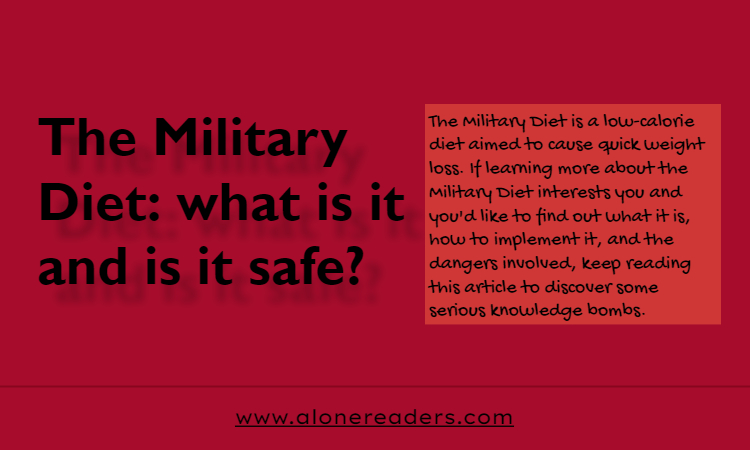
The Military Diet is a low-calorie diet aimed to cause quick weight loss. If learning more about the Military Diet interests you and you'd like to find out what it is, how to implement it, and the dangers involved, keep reading below to discover some serious knowledge bombs.
A three-day diet plan called the Military Diet promises to help people lose 10 pounds in one week. Every week, you would keep to a specified diet plan for three days before eating from a list of permitted foods for the next four days while continuing to maintain a lack of calories. Although there is no evidence in the literature to support this idea, this cycle of restricting and allowing is encouraged to help remove cravings.
Even though it doesn't seem like the Military Diet is based on any dietary guidelines that service members have to follow, this diet suggests the restriction that comes with being in the military.
The Military Diet doesn't require participants to buy any supplements, pre-made smoothies, or pre-packaged meals, unlike many popular diets today. There are no fitness requirements and no required changes in lifestyle.
You can lose weight by creating a calorie deficit by following a 3-day low-calorie diet once a week. You'll have to watch what you consume extremely carefully throughout this time.
Participants are advised to maintain their calorie deficit while enjoying more freedom with their diet during the four days off. It suggests multiplying your current weight by 12 to determine this. You should limit the calories you consume every day to that amount on your "days off." But you shouldn't consume more than 1,500 calories per day.
No allowance for food preferences or cravings is allowed on the Military Diet. On the accurate plan, you consume the following foods:
Even though the Military Diet limits your ability to choose what you eat, there are some things that are advised you stay away from while on this diet:
It's unsure that your doctor will advise following the Military Diet. Although you might initially lose weight, this eating style is not a long-term answer for lasting weight loss. Furthermore, if you have an active lifestyle, it might not give you enough calories to meet your demands.
Consulting with a qualified nutritionist to receive personalized weight reduction recommendations is a safer strategy if your objective is to lose weight.
The Military Diet strongly recommends calorie reduction and portion control. If you make substitutes, they must be measured and tallied in terms of calories for the first 3 days. Keeping a meal record and tracking your caloric intake is advised for the following four days.
The Military Diet is a strict low-calorie eating plan that calls for a number of certain meals that are said to "work together to jumpstart weight loss," although there is scant to no evidence to support this claim.
There is no evidence that combining the exact foods specified on the Military Diet can boost your metabolism and faster the weight reduction process, despite the fact that some meals, such as grapefruit, or caffeinated drinks, such as coffee, have been linked to weight loss12.
There is no single "official" source for the Military Diet, which further adds to the confusion. There are numerous books about the diet plan in addition to numerous websites.
The safety of following the Military Diet has not been researched. If you're thinking about attempting the diet, keep the following benefits and drawbacks in mind:
Pros
Cons
The 3-Day Military Diet, like most fad diets, has more negative side effects than positive ones.
Final word
The Military Diet is a calorie-restrictive, low-calorie diet. Even while people who follow this diet may lose weight, it's unlikely that it will be a long-term solution to help you reach your weight loss and health goals.